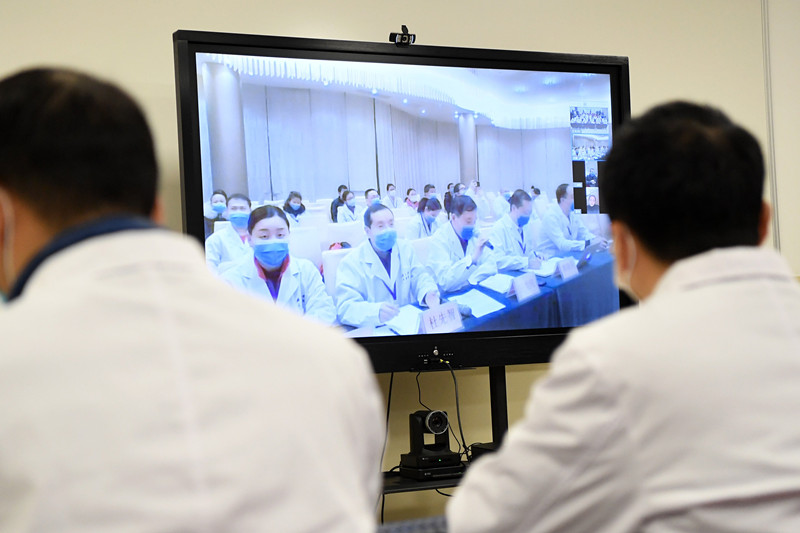COVID-19 epidemic and the rise of virtual meetings
- By Eugene Clark
 0 Comment(s)
0 Comment(s) Print
Print E-mail China.org.cn, March 13, 2020
E-mail China.org.cn, March 13, 2020

One result of the COVID-19 outbreak is that, increasingly, people are being forced to work from home, hold meetings, attend classes and other activities through virtual as opposed to face-to-face meetings.
This raises questions of how best to conduct such meetings to ensure they are effective and efficient. Indeed, poorly-run meetings not only waste resources, but also can result in poor organizational outcomes and low staff morale. What should be the rules for staging virtual meetings?
Preparation is key. Virtual meetings are not simply a matter of signing on to a software package or getting onto a free application like skype. Effective meetings, especially in an online environment, require careful preparation, which includes: acquiring the appropriate technology, testing it beforehand and making sure people know how to use it, etc.
Also, have a "Plan B," typically, a tech person at hand and helping you set up the meeting to ensure all goes well. Effective meetings have a clear agenda. Specify firmly when the meeting will start and end, determine its purpose, desired goals and expected outcomes and communicate them to all participants.
Circulate materials ahead of time. Give people a chance to read, study and reflect on the materials so they can focus their discussion on the most important points. Be sure to include an agenda as well as minutes, decisions and actions to follow-up on from any previous meeting. Keep the materials as brief as reasonably possible to maximize the chances they will be read.
Be an effective chairperson and establish meeting rules. Those who chair virtual meetings should be masters of process. This includes circulating as part of the minutes reminders about procedural rules.
Assign key roles. In virtual meetings, it is especially important to assign roles to other members. One person should be the note-taker. The focus for notes should be on decisions/actions taken, with a clear statement of who is responsible for what and by what date. These notes should be circulated as soon as possible after the meeting.
Make sure people know one another. In order to set the right tone, build trust and be inclusive, it is important to introduce all team members or have people introduce themselves. After the introductions, it's good if the meeting can start with an ice-breaker in which each person reports on one personal and one professional task they had dealt with in recent times. This recognizes that what happens in our personal lives has an impact on work, and vice versa.
Be inclusive. When a meeting is a mix of virtual and face-to-face attendees,make sure remote members are included. Consider appointing a person to make sure this happens. For example, remind those physically present to remember to be inclusive of those in a remote location. Make sure all have the relevant materials, for example, slide decks and other materials.
Structure the meeting so everyone contributes. It is important also to hear from everyone. Introverts can be especially reluctant to speak up in a digital meeting. Thus, provide a process in which you go around the table and hear from every one. Do not rely on people to speak up–ask them directly by name for their views.
Verbal summaries. Provide useful short summaries. In doing so, the chair should indicate clearly what decisions have been and outcomes achieved.
Make it fun; keep people involved and keep things moving. With the rapid growth in virtual meetings and rise of digital tribes, there are now many tools available to facilitate discussion, decision making, brainstorming and all other activities.
Commit to continuous improvement. Be sure to ask each person attending the meeting to list one to three good things about the meeting and suggest one improvement for future meetings.
Finally, note that effective meeting skills should be a vital part of every person's skill-set. Educators at all levels and leaders in organizations should provide instruction in meeting skills to their students/employees and thereby maximize the talents of their team members.
Eugene Clark is a columnist with China.org.cn. For more information please visit:
http://91dzs.com/opinion/eugeneclark.htm
Opinion articles reflect the views of their authors only, not necessarily those of China.org.cn.
If you would like to contribute, please contact us at opinion@china.org.cn.





